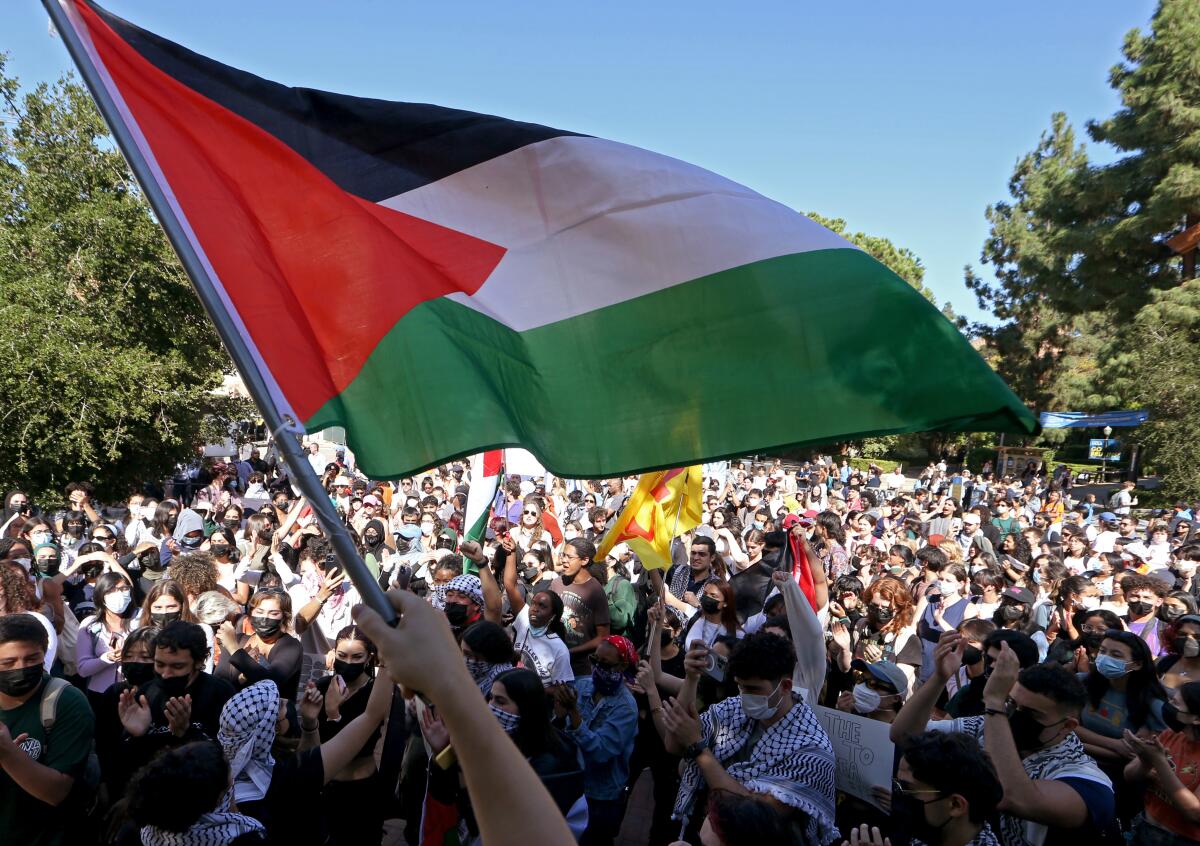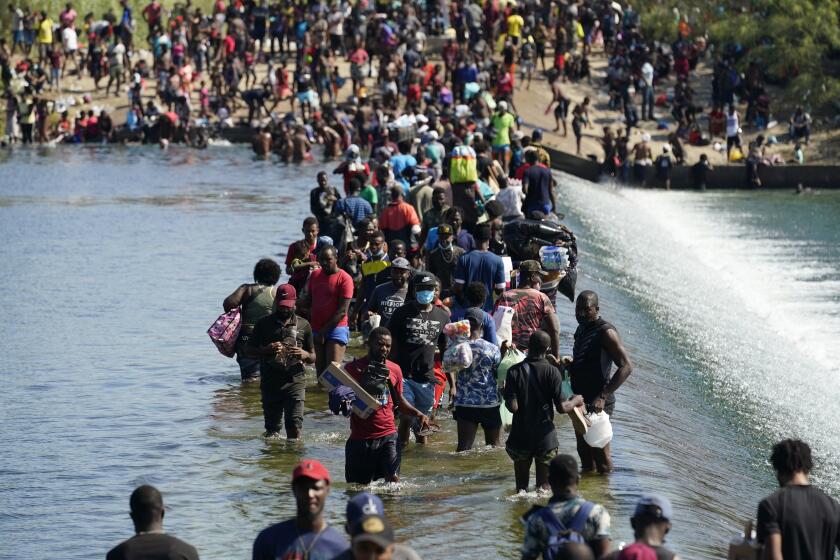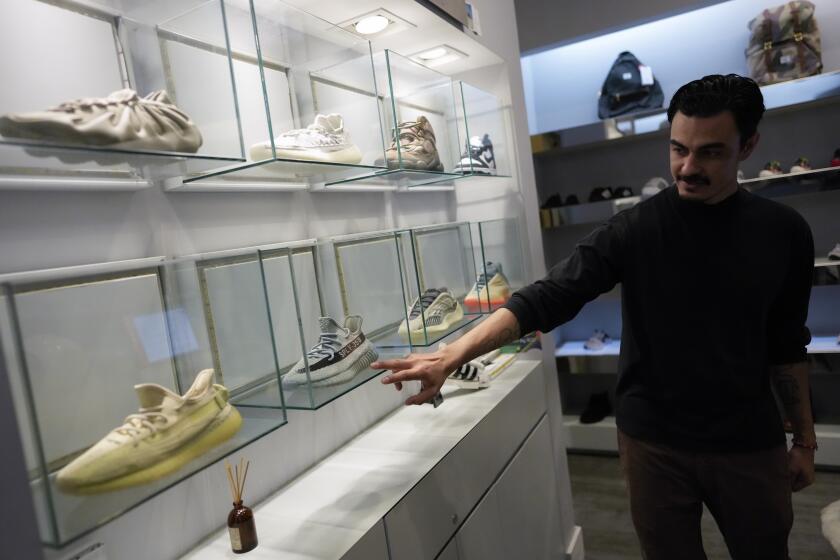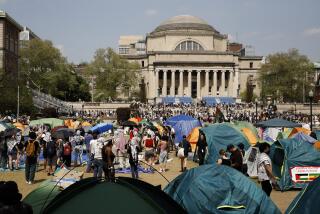Column: Those campus rallies arenât just pro-Palestinian. Theyâre anticolonial

Abe Baker-Butler, a junior at Yale University, was working on an essay in the library on Oct. 7 when his phone began buzzing and wouldnât stop. Israel was under attack.
As president of the American Jewish Committeeâs Campus Global Board, Baker-Butler was receiving texts from Jewish college students around the world, some of whom he had met during his most recent visit to Israel in June. Among those in the group chat were Israeli military reservists who have since returned to active duty.
Opinion Columnist
LZ Granderson
LZ Granderson writes about culture, politics, sports and navigating life in America.
Then came the âfree Palestineâ protests.
After the killings and kidnappings of Israeli civilians, he said, âthese campus rallies were supporting the successâ of Hamas.
âI couldnât believe it. These campus activists were holding a rally in what they say is in celebration of the resistance. I was extremely angry and disappointed,â Baker-Butler told me, adding: âA lot of Jewish students donât feel safe.â
The wave of migrants could create opportunities for terrorists, and U.S. intelligence on such threats is clearly far from perfect.
Antisemitism has long been a part of Americaâs fabric. In fact, in May the Biden administration released its National Strategy to Counter Antisemitism â the first of its kind â because of recent yearsâ uptick in violence and rhetoric against the Jewish community in the U.S.
Still, the beyond-tone-deaf rallies on campuses were a shock for a lot of people, including me. The death toll was still climbing in Israel, and it seemed many college students not only didnât care about the civilian victims but even supported what Hamas had done.
Iâm currently a visiting scholar at my alma mater, Western Michigan University, and I have not seen such protests on that campus. But I did witness one at Arizona State, one of the largest schools in the country. There were a lot of pro-Palestinian young people out marching, and many drivers honked their support as they passed.
The German apparel companyâs CEO said recently âI donât think he meant what he said.â Ye was pretty clear in threatening to âgo death con 3 On JEWISH PEOPLE.â
Without question, antisemitism is a significant factor behind attendance at some of these rallies. Any event that celebrates a Hamas terrorist attack against Israeli civilians gets that label automatically in my book.
However, another driving force is anticolonialism. And therein lies the challenge for not only Baker-Butler and the American Jewish Committee, but also the Biden administration and other progressives disturbed by pro-Palestinian rallies that erupted almost immediately after the massacres.
To a certain kind of educated younger audience, the modern state of Israel looks a lot like yet another byproduct of European imperialism. They arenât all wrong about that. There was the British Mandate for Palestine in 1923, which set the stage for dueling Palestinian and Jewish nationalist movements. Before settling on land in the Middle East, one Zionist leader proposed territory in whatâs now Kenya as a possible safe haven for Jews â as if the land in question were unoccupied and Englandâs to offer.
A dwindling fresh water supply after a 20-year drought pits Panamaniansâ need for drinking water against global demand for shipping. U.S. voters are key to the solution.
Imperialism was alive and well when modern Israel was created in 1948 and hadnât even had the decency to cloak itself under new names. England still had a âsecretary of state for the coloniesâ until 1966. So, yes, from a certain perspective, any defense of Israel sounds like a defense of a colonial land grab. And the legitimacy of that idea has very much gone out of style.
Many progressives are no longer interested in perpetuating nonsensical folklore such as âThanksgiving was a celebrationâ or âColumbus discovered America.â Indigenous Peoplesâ Day is a thing now. Modern audiences get prickly about narratives that leave out messy colonial history. Many understandably want to keep complexity in our understanding of the world we inherited.
When Iâve spoken one on one with pro-Palestinian students, they acknowledge that what Hamas did was wrong. They also donât hesitate to point out that Israel is a relatively recent creation, founded after World War II, and that Gaza â even before the bombings of recent days â was a resource-starved open-air prison.
It is my sense that for many attendees at pro-Palestinian rallies on campuses, the focus is on the past 100 years in the region, not the events from earlier this month. Todayâs 20-year-olds have grown up with a historical awareness that fewer had in previous generations. That doesnât mean they all arrive at the same interpretations.
âItâs not colonization,â Baker-Butler said. âIsrael is the homeland of the Jewish people. Modern politics says Israel was established in World War II, but the Jewish people have lived on the land much longer than that.â
So how would the president of the American Jewish Committeeâs campus group imagine making that point to his fellow students around the nation who are attending pro-Palestinian rallies? He says it starts with moving past fear and anger.
âThe only way to have these conversations is through small-group, in-person dialogue and talking face to face,â he said.
The organization recently provided parents and guardians tools to guide conversations about the Israel-Hamas war. On Thursday, Baker-Butler will be part of a virtual forum intended to let Jewish students share their feelings about the war and the challenges they currently face on campus.
âI have many friends in Israel, and many of them have lost friends and loved ones,â Baker-Butler said. âI was messaging one friend and asked if he was OK and he said, âYeah, but a bunch of my friends were murdered.â What kind of world are we living in?â
Itâs a world thatâs full of rage and violence. One in need of more compassion. One weâre counting on future generations to redeem.
More to Read
A cure for the common opinion
Get thought-provoking perspectives with our weekly newsletter.
You may occasionally receive promotional content from the Los Angeles Times.















